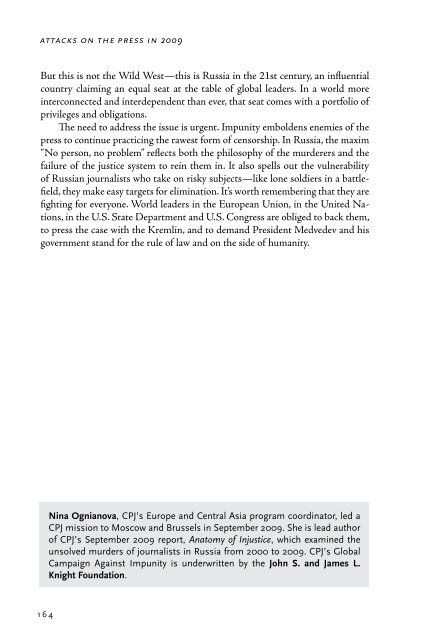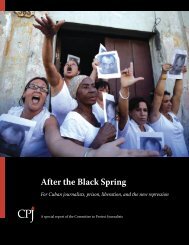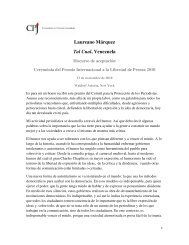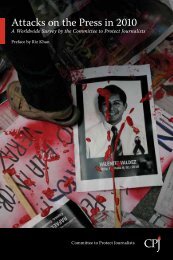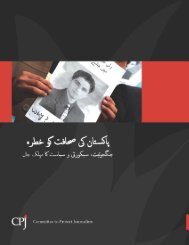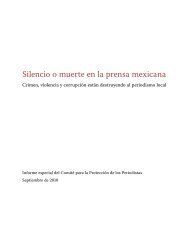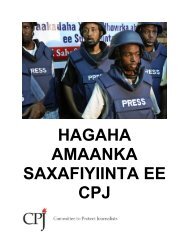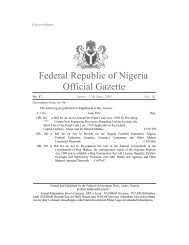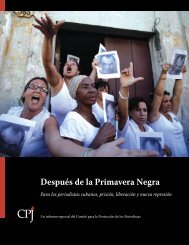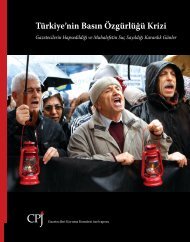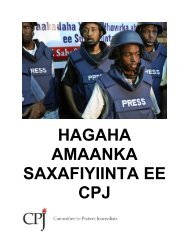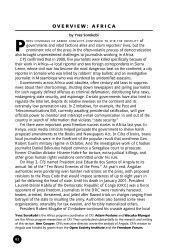Attacks on the Press - Committee to Protect Journalists
Attacks on the Press - Committee to Protect Journalists
Attacks on the Press - Committee to Protect Journalists
- No tags were found...
Create successful ePaper yourself
Turn your PDF publications into a flip-book with our unique Google optimized e-Paper software.
attacks <strong>on</strong> <strong>the</strong> press in 2009europe and central asia: armeniaBut this is not <strong>the</strong> Wild West—this is Russia in <strong>the</strong> 21st century, an influentialcountry claiming an equal seat at <strong>the</strong> table of global leaders. In a world moreinterc<strong>on</strong>nected and interdependent than ever, that seat comes with a portfolio ofprivileges and obligati<strong>on</strong>s.The need <strong>to</strong> address <strong>the</strong> issue is urgent. Impunity emboldens enemies of <strong>the</strong>press <strong>to</strong> c<strong>on</strong>tinue practicing <strong>the</strong> rawest form of censorship. In Russia, <strong>the</strong> maxim“No pers<strong>on</strong>, no problem” reflects both <strong>the</strong> philosophy of <strong>the</strong> murderers and <strong>the</strong>failure of <strong>the</strong> justice system <strong>to</strong> rein <strong>the</strong>m in. It also spells out <strong>the</strong> vulnerabilityof Russian journalists who take <strong>on</strong> risky subjects—like l<strong>on</strong>e soldiers in a battlefield,<strong>the</strong>y make easy targets for eliminati<strong>on</strong>. It’s worth remembering that <strong>the</strong>y arefighting for every<strong>on</strong>e. World leaders in <strong>the</strong> European Uni<strong>on</strong>, in <strong>the</strong> United Nati<strong>on</strong>s,in <strong>the</strong> U.S. State Department and U.S. C<strong>on</strong>gress are obliged <strong>to</strong> back <strong>the</strong>m,<strong>to</strong> press <strong>the</strong> case with <strong>the</strong> Kremlin, and <strong>to</strong> demand President Medvedev and hisgovernment stand for <strong>the</strong> rule of law and <strong>on</strong> <strong>the</strong> side of humanity.Nina Ognianova, CPJ’s Europe and Central Asia program coordina<strong>to</strong>r, led aCPJ missi<strong>on</strong> <strong>to</strong> Moscow and Brussels in September 2009. She is lead authorof CPJ’s September 2009 report, Ana<strong>to</strong>my of Injustice, which examined <strong>the</strong>unsolved murders of journalists in Russia from 2000 <strong>to</strong> 2009. CPJ’s GlobalCampaign Against Impunity is underwritten by <strong>the</strong> John S. and James L.Knight Foundati<strong>on</strong>.ARMENIAThe nati<strong>on</strong> remained polarized by <strong>the</strong> fraud-marred 2008presidential electi<strong>on</strong> w<strong>on</strong> by Serzh Sargsyan, with large public protests and violentgovernment reprisals c<strong>on</strong>tinuing well in<strong>to</strong> 2009. The global ec<strong>on</strong>omic crisiscaused layoffs in <strong>the</strong> mining industry and a decline in remittances from Russia,heightening public frustrati<strong>on</strong>s. The government sought <strong>to</strong> suppress critical debateover <strong>the</strong>se issues, and journalists faced in<strong>to</strong>lerance, hostility, and violence.The government maintainedc<strong>on</strong>trol over most broadcastmedia, <strong>the</strong> primary newssource in a poverty-afflictedcountry with poor newspaperdistributi<strong>on</strong> and low Internetpenetrati<strong>on</strong>. The Council <strong>on</strong>Public Radio and Televisi<strong>on</strong>,composed of presidential appointees,c<strong>on</strong>tinued <strong>to</strong> set edi<strong>to</strong>rialguidelines for H1 statetelevisi<strong>on</strong>, ensuring <strong>the</strong> stati<strong>on</strong>generated pro-government reports.Most private radio and»»Broadcast media c<strong>on</strong>trolled bygovernment or its allies.t o p developments»»Numerous assaults reported, butpolice do little.12key statisticBroadcast license applicati<strong>on</strong>sfiled by independent outlet A1+.N<strong>on</strong>e approved.televisi<strong>on</strong> stati<strong>on</strong>s were owned by politicians and businessmen with close ties <strong>to</strong><strong>the</strong> government, leading <strong>to</strong> significant self-censorship by journalists and limitedcritical news reporting <strong>on</strong> <strong>the</strong> airwaves, CPJ research showed.One independent news outlet remained off <strong>the</strong> air. In February, a Yerevanappellate court dismissed lawsuits filed by <strong>the</strong> media outlet A1+ that sought rec<strong>on</strong>siderati<strong>on</strong>of its broadcast license applicati<strong>on</strong>s. The stati<strong>on</strong>, pulled from <strong>the</strong>airwaves in 2002 in reprisal for its critical news reports, has seen a dozen licenseapplicati<strong>on</strong>s rejected by <strong>the</strong> government’s broadcast regula<strong>to</strong>r. (A1+ has c<strong>on</strong>tinuedoperating as an independent <strong>on</strong>line news agency.) The Strasbourg-basedEuropean Court of Human Rights ruled in 2008 that <strong>the</strong> regula<strong>to</strong>r violated <strong>the</strong>European C<strong>on</strong>venti<strong>on</strong> <strong>on</strong> Human Rights by repeatedly rejecting <strong>the</strong> applicati<strong>on</strong>swithout explanati<strong>on</strong>.Country summaries in this chapter were researched and written by Europeand Central Asia Program Coordina<strong>to</strong>r Nina Ognianova, Research AssociateMuzaffar Suleymanov, and freelance writers Alex Lupis and Ca<strong>the</strong>rineFitzpatrick.164165


